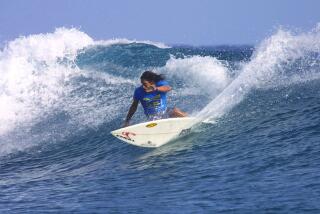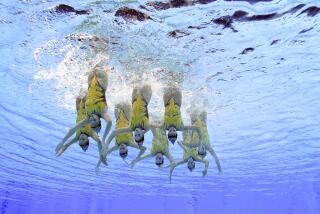Treading Thoughtfully
- Share via
People who are drowning are advised to kick off their shoes. People who have fallen into the water and are going to hop back on land hang on to their shoes. This is why I was clinging to my flip-flops.
I had just left the tide pool where we’d been swimming. To get there, we had taken a dirt road through silver-green pineapple fields and then clambered down a steep path into a cove. We were miles from a bathroom, so I decided the most private place was over the edge of the tide pool, where I found still water fed by ocean surges, apparently protected from waves by a natural rock wall. The only other person nearby was a woman videotaping the waves from the top of the cliff.
My husband Jeremy was still in the tide pool when I knew I was in trouble. The waves were rising and falling, not crashing, so at first I thought I could ride one up to the rocks I’d just left and scramble back into the tide pool. But each time a wave lifted me gently up and in and I curled my fingers around a rock, the retreating wave would pull me back down hard and fast. And then everything was bright white water and I was struggling to get up to the air again, spitting out water, bewildered and terrified.
Finally, Jeremy saw me. I let go of the pretense of hopping right back out, and so let my flip-flops go too. I remember Jeremy’s face--actually I don’t know if I’m remembering his face or his voice or something else, but I sensed complete helplessness and terror.
Panicked, needing to say something, he told me to swim to some of the lower rocks. They looked close, and if you weren’t in the water feeling the strength of the surges, it looked doable. It was impossible. The woman on the cliff spotted me and threw a rope. Jeremy couldn’t find it, but he found another and tied one end to a rock on shore. He threw the other end into the water, but I couldn’t reach it. I told him to call 911 and--afraid to leave, but helpless if he stayed--he reluctantly went to retrieve the cellphone from our car. Then it was just me and the bright yellow rope and the rise and fall of the waves. I bobbed with the waves and kept my head above water.
I am not interested in adrenaline highs. I buckle my seat belt; I don’t ride roller coasters, I stay out of the water when the ocean looks rough. My favorite outdoor adventure is floating down a gentle river on an inner tube. I was raised by Safety Dad, a man who had grown up on Maui and knew its perils. When we were young my father skipped the drug talk, and instead gave my sister and me the tsunami talk, telling us we should run to high ground if we ever saw the ocean retreating. At that time, when all I knew of tsunamis came from Japanese woodblock prints, such a warning seemed the epitome of my father’s unending crazy worry.
He informed us about riptides and currents and horrible things that had happened to little girls who hadn’t heeded their fathers’ warnings. His tours of Maui were full of tales about honeymoon couples who had fallen off cliffs and died (backing up to take pictures, picking fruit on overhangs, diving off waterfalls into shallow pools). Where others saw wonderful black cliffs and sparkling deep-blue water, we saw the aloha-shirted bodies of drowned tourists.
Now, treading water, I thought of all those warnings and his mandate not to panic, ever. I thought of the water safety class I’d taken at the YWCA when I was 10. I tried to remember if certain movements attracted sharks. I thought about how pretty the cliffs looked and about a neighbor’s daughter who’d been swept out to sea and never found. For the first time in a long while I didn’t worry about not having a job or a life plan. Instead, I just thought about how nice it would be to be out of the water and how little I wanted to die.
I tried to breathe in and out deliberately, slowly. I finally caught the end of that yellow rope. I pulled up the slack and held on as the waves pushed me up one more time, and then I tugged hard on the rope. It slipped off the rock and into the water.
I was tired and baffled to still be struggling with each wave. It was too hard and I wanted to float instead. Just float. So I swam out to calmer water and settled into a very slow tread.
I looked up to see the videotape woman talking to Jeremy. She was talking into a cellphone. Jeremy walked back to the rocks, a good 10 feet above the highest surges. Someone would come get me in 10 minutes, he said. I told him to keep talking to me. Tried to joke, asked him if we needed to tell my dad, told him I loved him, explained how to use a visual marker to locate me should I slip under. I was not planning to go under, but it never hurts to show off one’s level-headedness.
And then Jeremy was gone. White water was flowing down the rocks where he’d been standing. He’d been washed away, and I couldn’t make it back to help him. I knew all of this, and was reduced to a selfish anguish that I wouldn’t see him again, that I’d met someone so good for me and now he was gone. But just a minute later I saw his head above the rocks. He’d been knocked backward and tumbled over by the wave and spit out into the tide pool.
A few minutes later a helicopter arrived and lowered a little net basket. A man popped out, helped me get seated and we floated up magically. Ascended, you might say, the motion being so gentle and the cliffs so beautiful and the grass on top of the cliffs getting closer and closer.
I have never been so overjoyed to sit on grass.
Shock is a wonderful thing. It was what allowed me to talk sensibly to my rescuers--Maui Fire Department Rescue 10 and the woman with the camera, a painter named Diana Lehr--to give them my address and chat about other rescues in the area, very few as lucky as mine, I discovered.
Jeremy and I talked it out on the drive home, debated telling my parents, squeezed hands. All the what-ifs came later, when we told my parents and friends. When we washed the sea out of our cuts. When my mother hugged me. When I tried to sleep and instead thought of all those people in the recent tsunami without helicopters to get them, without calm water to float in, without husbands, friends, neighbors reappearing on dry land above the water’s edge.
More to Read
Sign up for The Wild
We’ll help you find the best places to hike, bike and run, as well as the perfect silent spots for meditation and yoga.
You may occasionally receive promotional content from the Los Angeles Times.






